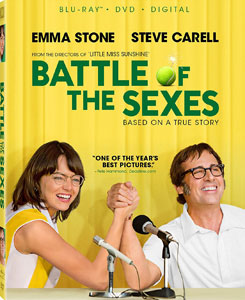When I first got into tennis fandom and learned about the Billie Jean King-Bobby Riggs Battle of the Sexes of the 1970s, I assumed it was some sort of novelty sideshow. After all, when Agassi and Federer played on a rooftop, and when Federer and Nadal played on a half-grass, half-clay court, it was news for about an hour. And does anyone even remember that Serena and Venus challenged male journeyman Karsten Braasch in 1998? (He beat them both.)
I’ve since learned the King-Riggs match had true cultural significance, and “Battle of the Sexes” (2017) – now available via streaming – captures that in its climactic (or perhaps anti-climactic) final act, with re-creations of scenes from the match and commentary from the TV booth.
But the match was also indeed a novelty sideshow, albeit one that drew 30,000 to watch the first tennis competition in the Astrodome, and that awarded $100,000 to the winner. Written by Simon Beaufoy (“The Hunger Games: Catching Fire”) and directed by the team of Jonathan Dayton and Valerie Faris (“Little Miss Sunshine”), “Battle of the Sexes” gives a warm portrayal of the man who dreamed up the match, Riggs (Steve Carell), that might surprise some.
As the boss on the American version of “The Office,” Carell played someone who wanted to believe what he said. Here, he plays someone who clearly doesn’t believe what he’s saying. Arguably an even better hustler than he was a tennis player (and he won three grand slams and three pro majors), he says things like “The male is supreme” and “Women belong in the kitchen” to the camera in order to drum up publicity for the match. Yet his wife, Priscilla (Elisabeth Shue), is the most important person in his life, something he openly admits – even though he can’t quit gambling for her.
Still, after defeating Margaret Court – to this day, the all-time grand slam record-holder with 24 — he does underestimate Billie Jean, played by Emma Stone. (On a related note, Michael and I will be played by Jonah Hill and Jake Gyllenhaal in the “Reviews from My Couch” movie.) Hollywood casting it may be, but Stone disappears into the role behind glasses and thick black hair.
Although we’re informed by her husband, Larry (Austin Stowell), that tennis is Billie Jean’s biggest love, the heart of “Battle of the Sexes” turns out to be her relationship with Marilyn (Andrea Riseborough). Billie Jean always introduces Marilyn as her “hairdresser,” which is technically true, but the sparks fly off the screen in a sensual introductory salon scene. For all her faults, give Court (Jessica McNamee) credit for a well-honed gay-dar, as she figures out the pair are lovers.
Billie Jean and Marilyn end up being the heart of the movie, although the screenwriters also tell the surprisingly straightforward story of the start of the Women’s Tennis Association (WTA), which to this day is the governing body of top-level women’s tennis.
King is often portrayed as a daring pioneer, but it’s interesting how the decision is a no-brainer. Coming off a tournament where the women’s final sold just as many tickets as the men’s, King and her manager, Gladys (Sarah Silverman), suggest to International Lawn Tennis Association head Jack Kramer (a slime-dripping Bill Pullman) that perhaps the women’s purse should be more than a mere 1/12th of the men’s purse. He declines, so King and eight other players form the WTA.

Kramer’s threats are ridiculous, including a warning that the grand slams will ban WTA players (They did not.). Still, “Battle of the Sexes” shows us that the nine women have to sell tickets and set up the courts themselves until the sponsorships arrive. Ironically, the savior is a product that’s about as far away from tennis as you can get: Virginia Slims cigarettes. In a soft touch characteristic of the film, Gladys at one point sardonically asks one of the tennis players to take up smoking.
Between those three things – King’s life, Riggs’ life and the formation of the WTA – plus the titular match, there’s not much room left for two other things: 1) The other WTA pioneers (ranging from well-known Rosie Casals to Jane “Peaches” Bartkowicz, whose career didn’t get off the ground), and 2) the game of tennis. The portrayal of the big match is fine, as Stone, Carell and their stunt doubles (many scenes are shot from a distance) capture the soft lobs and angled placement shots of a 1970s match, before the power era that began a decade later.
King, 29, beats the 55-year-old Riggs in three straightforward sets by running him all over the court, and she proves her original thesis: That women’s tennis – unlike the Battle of the Sexes itself — is not a circus sideshow to be laughed at. It can stand as its own thing that doesn’t need to be in the shadow of men’s tennis. (The WTA even has their own TV contract nowadays, much to the dismay of fans who don’t get beIN Sports.) Today, tennis is the most popular sport where the men’s and women’s circuits share near-equal popularity and visibility.
Still, it’s Billie Jean and Marilyn who linger in a viewer’s mind, and in a nice bit of dovetailing with the WTA formation arc, the seeds are planted for King to learn she can be her own person. I like the way “Battle of the Sexes” doesn’t lionize this 12-time grand slam champion, but rather shows her as a professional athlete who is called upon to make an obvious-yet-brave move at a pivotal point in history.

